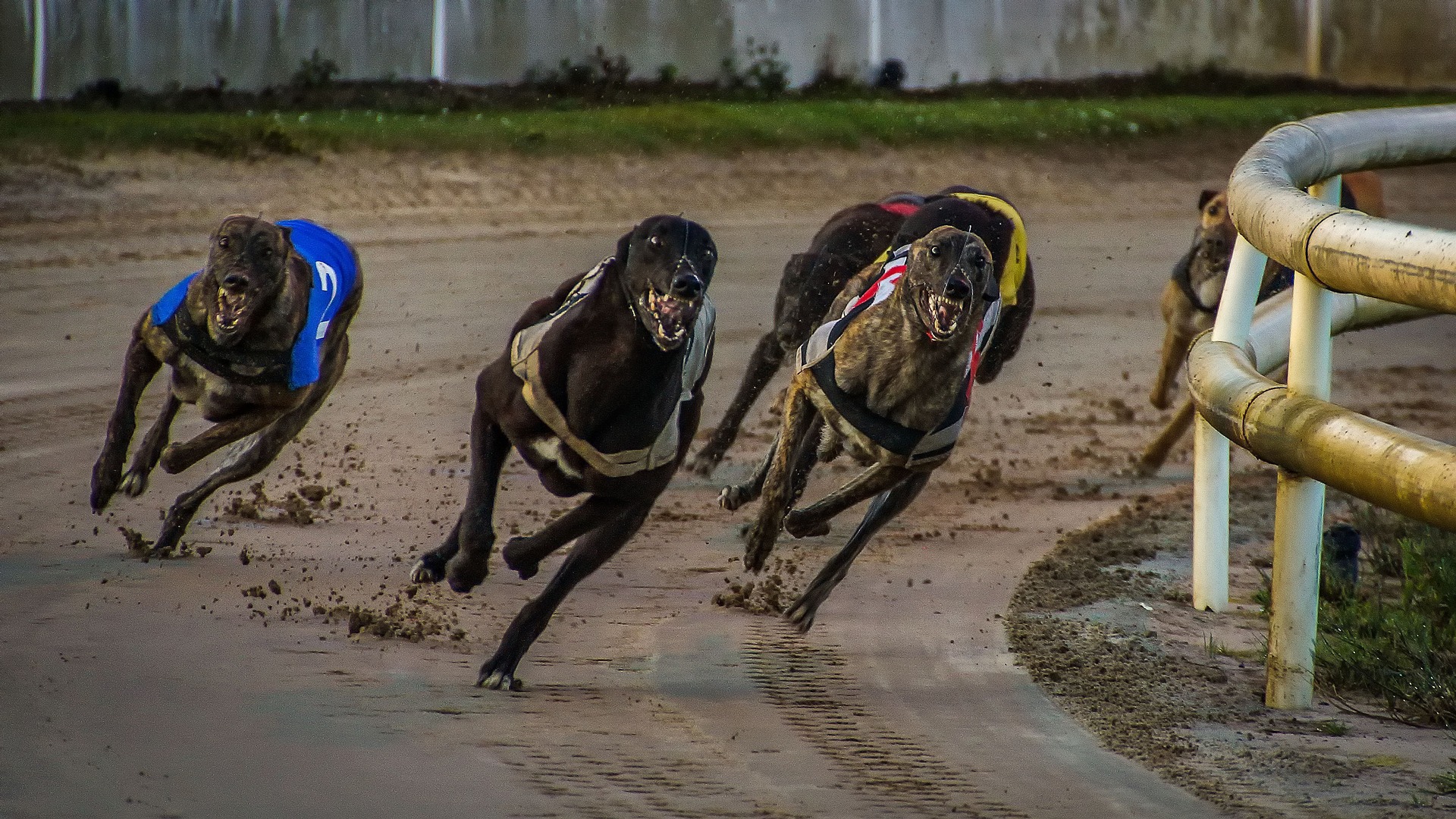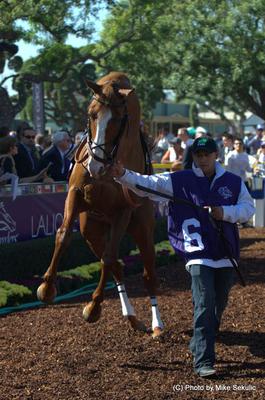Successful Racehorse Ownership
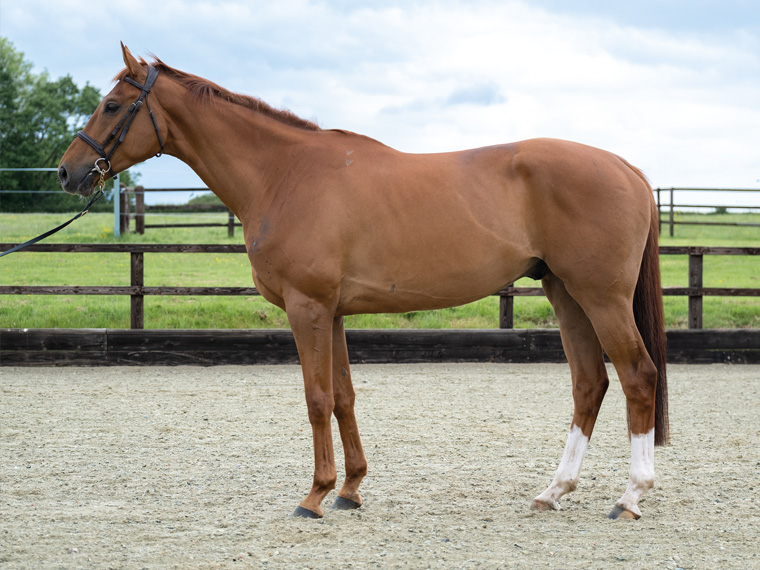 My journey to successful racehorse ownership begins with 'The Final Word'
My journey to successful racehorse ownership begins with 'The Final Word'Racehorse ownership is a thrilling venture that combines the excitement of sport with the potential for financial gain. It has always been in the back of my mind that it would be nice to own a racehorse but I thought it would be prohibitively expensive.
Imagine my delight this year, as a birthday present from my sister, I was given membership in the Owners Group of a syndicate that owned a horse called The Final Word.
The membership lasts one year with the option to renew it at the very reasonable cost of £57. This is the total cost which is shared between 3500 other syndicate members. Benefits include regular updates, free stable visits, owner’s badges, video updates of my horse and a monthly magazine.
She chose that thoroughbred, from a choice of several, as we both share a love for jumps racing at Wincanton. The horse will be trained by Paul Nicholls at his yard in Ditcheat and is likely to be entered in races nearby at our favourite course.
Whether pursuing individual ownership or joining a syndicate, entering the world of horse racing requires careful consideration, knowledge, and strategic planning. So let's delve into the nitty gritty of successful racehorse ownership, from selecting the right horse to understanding the costs and benefits involved.
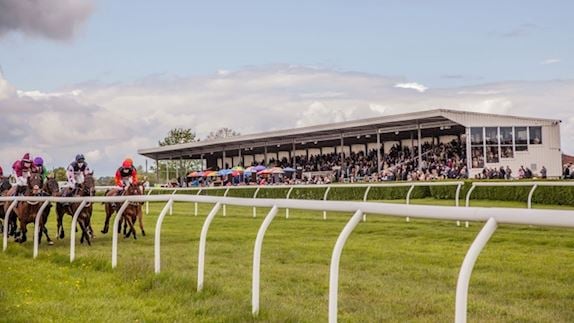 Wincanton Racecourse
Wincanton RacecourseFinal Word News
THE FINAL WORD - Darrell Scaife
Tuesday 9 July 2024
The Final Word came in last week with an abscess, which has burst over the weekend, but will need to be repoulticed throughout the week to ensure all of the puss drains out. He is happy in the loose barn.
1. Choosing a Racehorse
Selecting the right racehorse is crucial for success in the sport. Here are key factors to consider:
- Consider specific genetic traits that may indicate aptitude for certain race types or distances. There are many sources of information on thoroughbred pedigrees such as the .
a) Pedigree:
- Examine the horse's bloodlines, focusing on both sire (father) and dam (mother).
- Look for successful racehorses in the family tree.Racing Post Bloodstock
b) Conformation:
- Assess the horse's physical structure and proportions. I am fortunate to know a lady who was an expert Paddock Judge. For those that don't know a racecourse paddock judge acts as an observer for the horses before a race.
They assess the horses' overall condition, looking for signs of health, fitness, and temperament. Particularly they can assess balanced musculature, strong bone structure, and correct leg alignment.
- Consider how conformation might affect performance and longevity.
 Dee Thompson Paddock Judge
Dee Thompson Paddock Judgec) Performance history (for older horses):
- Review past race results and performance patterns.
- Analyze speed figures and class levels of previous races.
- Consider consistency and improvement over time.
You can access this type of information from many racing websites including attheraces.com.
d) Veterinary examinations:
- Conduct thorough pre-purchase veterinary exams.
- Include X-rays, endoscopic examinations, and blood tests.
- Assess for any existing conditions or potential future issues.
e) Age and maturity:
- Decide between purchasing a yearling, two-year-old, or older horse.
- Consider the trade-offs between potential and proven ability.
- Factor in development time and associated costs.
f) Purchase options:
- Explore various acquisition methods: public auctions, private sales, or claiming races.
- Understand the pros and cons of each purchase method.
- Consider working with a bloodstock agent for expert advice.
g) Budget:
- Determine your budget for purchase and ongoing expenses.
- Balance quality with affordability.
- Consider potential resale value.
h) Racing goals:
- Align your choice with your racing ambitions (e.g., sprints vs. long-distance races on the flat or hurdles or fences for jumps racing
- Consider the level of competition you aim to enter
I personally love jumps racing which features in the UK, Irish and French racing calendars.
i) Temperament:
- Assess the horse's personality and trainability.
- Consider how well the horse's temperament matches your goals and resources.
Selecting a Trainer
Choosing the right trainer is crucial for your horse's success and your experience as an owner. It is worth mentioning that the more successful a trainer is the higher the cost will be. Also the trainer might not agree to train your horse on the grounds that it is not of a suitable calibre or the type of horse.
Here are key factors to consider:
a) Track record and expertise:
- Examine the trainer's win percentage and earnings.
- Look at their success in different race types and with various horse breeds.
- Consider their experience with horses similar to yours in age, class, and racing style.
All this information is freely available on sites such as Racing Post
b) Specialization:
- Some trainers excel with specific types of horses (e.g., sprinters, long-distance runners, jumps or flat). You probably know which trainers have a good reputation but 2 considerations worth bearing in mind are
1. If you are interested in a champion trainer then their fees are likely to be a lot higher than a less well known one and the quality of their horses is also likely to be high.
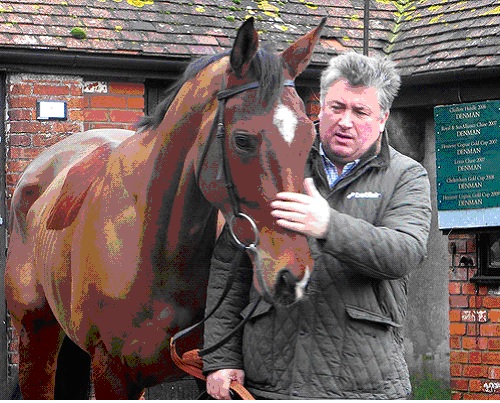 Paul Nicholls Racehorse Trainer
Paul Nicholls Racehorse TrainerA trainer is likely to run his horses most often at his or her local tracks, so you would not want to travel too far to watch your horse race.
As Paul Nicholls, who will train 'The Final Word' in Somerset it means that his nearest racecourses are Wincanton, Taunton and Newton Abott.
- Others may specialize in developing young horses or rehabilitating older ones.
c) Training facilities:
- Assess the quality of the trainer's facilities.
- Consider factors like track condition, barn quality, and available amenities.
- Evaluate the location in relation to your preferred racing circuit.
d) Communication style:
- Ensure the trainer's communication style aligns with your preferences.
- Discuss expectations for updates on your horse's progress and race planning.
Some trainers are good at looking after their owners. Such as allowing visits to the yard, keeping the owners updated on the horse’s progress and discussing which races would be suitable for your horse to enter.
Being a member of the Owners Group I will be invited to stable tours at Paul Nicholl's Ditcheat yard.
e) Horse management philosophy:
- Understand the trainer's approach to training, nutrition, and horse care.
- Ensure their methods align with your values and goals.
f) Staff and support team:
- Evaluate the quality and experience of the trainer's support staff.
- Consider the trainer's relationships with top jockeys and other industry professionals.
g) Reputation and integrity:
- Research the trainer's standing in the racing community.
- Look for any history of rules violations or ethical concerns.
h) Fees and payment structure:
- Understand the trainer's fee structure (daily rate, performance bonuses, etc.).
- Discuss billing practices and any additional charges.
i) Availability and attention:
- Consider the size of the trainer's stable and their ability to give attention to your horse.
- Discuss how hands-on the trainer is versus delegating to assistant trainers.
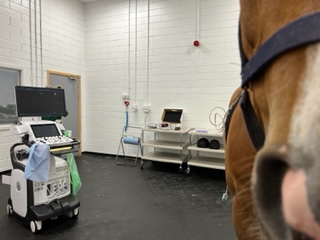 Horse Vet Surgery
Horse Vet Surgeryj) Location and circuit:
- Choose a trainer who operates in your preferred racing locations.
- Consider how their circuit aligns with your racing goals.
k) Owner involvement:
- Discuss your desired level of involvement in decision-making.
- Ensure the trainer is comfortable with your preferred level of participation.
l) References:
- Speak with other owners who have worked with the trainer.
- Get insights into the trainer's strengths and weaknesses from industry professionals.
Understanding Race Types and Planning a Successful Racehorse Ownership
Successful racehorse ownership involves strategic planning of your horse's racing career. This requires a thorough understanding of different race types and how to match your horse's abilities to appropriate competitions.
a) Types of races:
1. Maiden races:
- For horses that have never won a race
- Often the starting point for young or inexperienced horses
2. Claiming races:
- Horses can be purchased (claimed) for a predetermined price
- Levels range from low-end to high-end claiming races
3. Allowance races:
- For horses that have won races but aren't ready for stakes level
- Conditions based on number of wins, earnings, or other factors
4. Stakes races:
- Highest level of competition
- Include graded stakes (Grade 1, 2, 3) and listed stakes
- Often have the largest purses and most prestige
5. Handicap races:
- Horses carry different weights based on their perceived ability
- Aim to level the playing field and create competitive races
b) Race distances:
- Sprints: Typically 5-7 furlongs
- Middle distances: Usually 1 mile to 1 1/8 miles
- Route races: 1 1/4 miles and beyond
c) Surface types:
- Dirt
- Turf (grass)
- Synthetic/all-weather tracks
d)Chase, hurdle and national hunt flat races such as take place in the UK, Ireland and France
 Chelmsford All Weather Course
Chelmsford All Weather CourseBoth individual ownership and syndicate ownership have their own advantages and challenges. Understanding these can help you choose the best approach for your circumstances.
Individual Ownership:
Advantages:
- Full control over decisions regarding the horse's career
- Potential for greater financial returns if the horse is successful
- Personal relationship with the horse and more intimate involvement in its career
- Flexibility in choosing trainers, races, and overall management
Challenges:
- Higher financial risk and investment
- Full responsibility for all costs and decisions
- Can be time-consuming to manage all aspects of ownership
- Emotional stress of solely bearing setbacks or disappointments
There are small yards which offer the option of joint ownership such as Girsonfield Stud & Racing run by family-oriented trainer and breeder Susan Corbett.
Although a smallish yard with 30 horses they are currently at the top of the Hexham trainers league.A typical ownership offers shares at £1000.00 per 10% to buy in then £200.00 per month fully inclusive.
Syndicate Ownership:
Advantages:
- Reduced financial risk and lower initial investment
- Shared costs for training, veterinary care, and other expenses
- Access to higher quality horses that might be unaffordable individually
- Potential for a broader racing experience with multiple horses
- Shared knowledge and experience among syndicate members
- Social aspect of ownership with like-minded individuals
Challenges:
- Less individual control over decisions
- Profits are shared, potentially reducing individual returns
- Potential for disagreements among syndicate members
- May have less personal connection with the horse
Syndicate Structures:
1. Racing syndicates:
- Focus solely on racing the horse
- Typically dissolve once the horse's racing career ends
2. Breeding syndicates:
- Formed for valuable breeding stock
- Members often have breeding rights to the horse
3. Lease syndicates:
- Lease a horse for a set period, often a racing season
- Lower initial costs but also lower potential for long-term gains
4. Commercial syndicates:
- Professionally managed, often with multiple horses
- May offer more formal structure and reporting
One such is the Owners Group as mentioned earlier in this article.
 Syndicate Owned Kingston Rock
Syndicate Owned Kingston Rock3. Lease syndicates:
- Lease a horse for a set period, often a racing season
- Lower initial costs but also lower potential for long-term gains
4. Commercial syndicates:
- Professionally managed, often with multiple horses
- May offer more formal structure and reporting
One such is the Owners Group as mentioned earlier in this article.
Considerations for Choosing Between Individual and Syndicate Ownership:
1. Financial capacity and risk tolerance
2. Time available for involvement in horse management
3. Level of control desired over decision-making
4. Interest in the social aspects of successful racehorse ownership
5. Long-term goals (racing only vs. potential breeding interests)
6. Experience level in the racing industry
5. Costs Associated with Racehorse Ownership
Understanding the financial commitments involved in successful racehorse ownership is crucial for both individual owners and syndicate members. Here's a breakdown of the typical costs:
a) Initial Purchase or Buy-in:
- Purchase price at auction or private sale
- Syndicate share cost (for syndicate ownership)
- Agent fees if using a bloodstock agent (typically 5% of purchase price)
b) Training Fees:
- Daily rate charged by trainers (varies widely, typically $50-$120 per day)
- Often billed monthly and includes basic care, feed, and exercise
c) Veterinary Expenses:
- Routine care (vaccinations, deworming, dental work)
- Emergency care and potential surgeries
- Diagnostic procedures (X-rays, ultrasounds, endoscopy)
d) Farrier Services:
- Regular shoeing (every 4-6 weeks)
- Specialized shoes if needed
e) Transportation Costs:
- Shipping to and from races
- Potential long-distance transport for major races
f) Race Entry Fees:
- Nomination fees for stakes races
- Entry and starting fees
g) Jockey Fees:
- Standard mount fee
- Percentage of purse earnings (typically 10% for wins, 5% for place and show)
h) Insurance:
- Mortality insurance
- Major medical insurance
- Loss of use insurance for valuable breeding stock
i) Licensing and Registration:
- Owner's license fees
- Horse registration fees
j) Equine Therapy:
- Massage, chiropractic care, acupuncture, etc.
- Hydrotherapy or other specialized treatments
k) Feed Supplements:
- Any additional supplements beyond standard feed provided by the trainer
l) Administrative Costs:
- Bookkeeping and accounting services
- Legal fees for contracts and agreements
m) Syndicate Management Fees (if applicable):
- Fees charged by syndicate managers for administration and reporting
n) Layup or Rehabilitation Costs:
- Expenses during non-racing periods or injury recovery
o) Sales Preparation (if selling):
- Costs associated with preparing a horse for auction
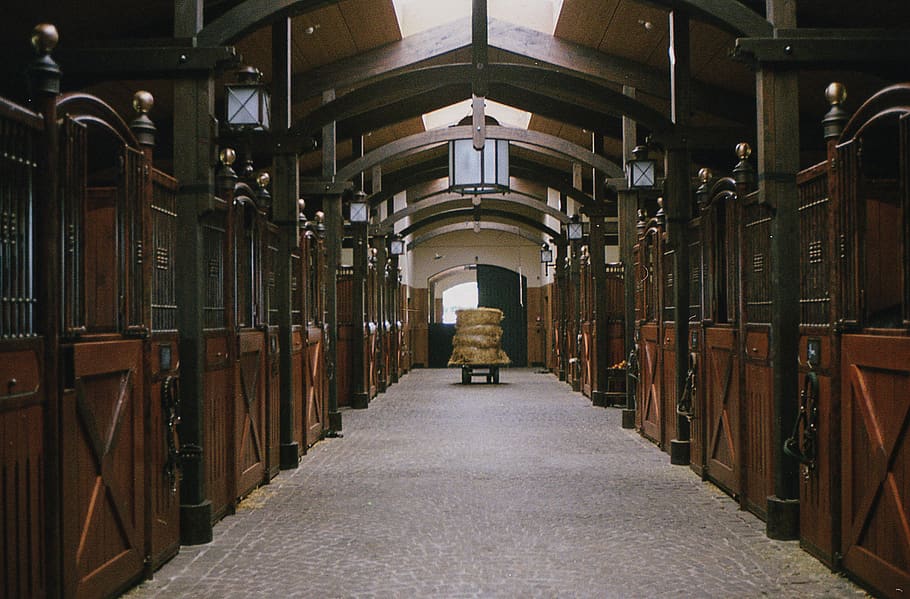 Well Maintained Stables
Well Maintained StablesAnnual Cost Estimates:
- Costs can vary widely depending on the level of racing and individual horse needs
- A conservative estimate might range from $30,000 to $50,000 per year
- High-end racing operations can easily exceed $100,000 per year per horse
It's important to note that these costs can fluctuate based on factors such as the horse's health, racing schedule, and level of competition. Potential owners should be prepared for unexpected expenses and should have a financial buffer beyond the basic anticipated costs.
6. Potential Benefits and Rewards of successful racehorse ownership
While racehorse ownership involves significant costs and risks, it can also offer various benefits and rewards. These can be both financial and intangible:
a) Financial Rewards:
1. Purse Money:
- Earnings from race winnings
- Typically distributed as 60% to the winner, with lesser amounts for place and show positions
- Can range from a few thousand dollars in smaller races to millions in major stakes races
2. Breeding Rights:
- Successful racehorses, especially stallions, can generate significant income through stud fees
- Broodmares can produce valuable offspring
3. Sales Proceeds:
- Potential profits from selling a successful racehorse or its progeny
- Horses with good race records or pedigrees can command high prices
4. Secondary Income:
- Potential earnings from appearance fees, sponsorships, or media rights for high-profile horses
b) Intangible Benefits:
1. Thrill and Excitement:
- The adrenaline rush of watching your horse compete
- Anticipation and excitement leading up to race day
2. Prestige:
- Recognition in the racing community
- Potential to win prestigious races and awards
3. Social Aspects:
- Networking opportunities within the racing industry
- Forming friendships with other owners, trainers, and industry professionals
4. Behind-the-Scenes Access:
- Exclusive access to restricted areas at racetracks
- Insider's view of the racing world
5. Personal Fulfillment:
- Sense of achievement in developing a successful racehorse
- Emotional connection with the horses
6. Legacy:
- Opportunity to contribute to the sport's history and breeding lineages
- Potential to have a long-lasting impact on the racing industry
7. Learning Experience:
- Gaining knowledge about horse racing, breeding, and equine management
- Developing business skills related to the racing industry
8. Lifestyle:
- Travel opportunities to attend races in different locations
- Participation in social events associated with racing
c) Tax Considerations:
- Potential tax deductions for horse-related expenses (consult with a tax professional)
- Opportunity to depreciate horses used for breeding purposes
d) Charitable Opportunities:
- Using racing success to support equine-related charities
- Potential to donate a percentage of winnings to good causes
It's important to note that while these benefits can be significant, they are not guaranteed. Many racehorses do not earn back their costs, and financial success in horse racing is relatively rare. The intangible benefits often become the primary reward for many owners.
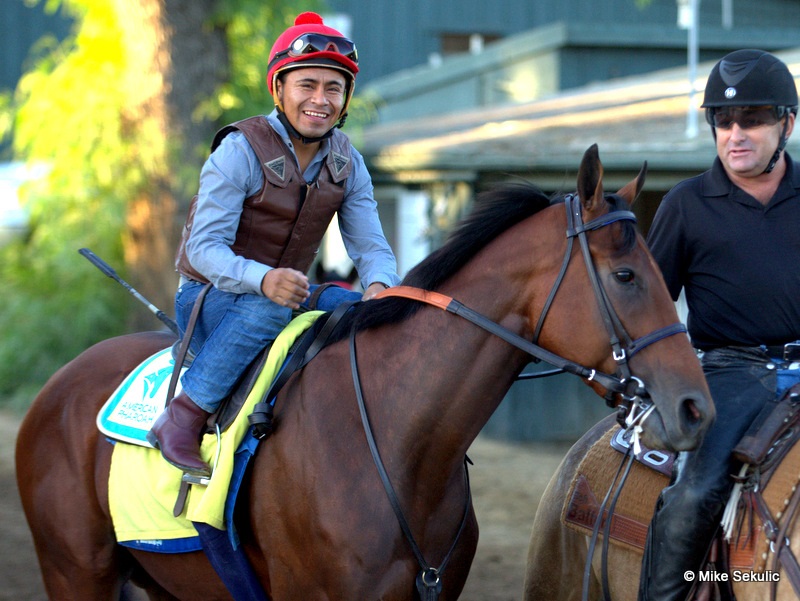 High Earning American Pharoah Won over £5.5m and earns $50,000 for standing at stud
High Earning American Pharoah Won over £5.5m and earns $50,000 for standing at studRacing Rules and Regulations:
- Familiarize yourself with the rules set by racing authorities
- Understand medication regulations and prohibited substances
- Be aware of claiming race rules if participating in such events
Although the trainer or syndicate management will be primarily responsible for adhering to the rules and regulations of racing it is as well for the owner to be aware of the main ones.
Help in this area can be obtained from the British Horseracing Association or the Jockey Club.
Conclusion:
Racehorse ownership, whether individual or through a syndicate, offers a unique blend of excitement, challenge, and potential reward.
It's a venture that I am just embarking on and although things can often go wrong in the world of racing, injuries, lack of success etc. the fun and excitement of owning a racehorse and jumping up and down with your family and friends as you urge your horse towards the winning post, has got to be one of the best experiences ever.
Your second block of text...
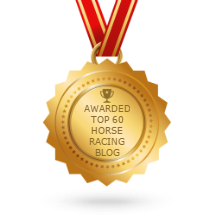
You Might Like These
Kentucky Derby Odds: Will there be a hometown favorite?
Preakness Stakes Odds: Will the champions face fresh challengers?
Belmont Stakes Odds: At 1½ miles, stamina becomes the great equalizer as longshots can threaten.
Breeders' Cup Odds: International talent collides with American speed, reshuffling expectations across the board.
Dubai World Cup Odds: Under desert lights, can a Japanese sensation prevail against the world's elite.
Pegasus Cup Odds: Retirement beckons for champions seeking one final payday at America's richest race.
Bet on Horses: Every wager tells a story of hope against mathematical probability.
Kentucky Derby Betting: Beneath fancy hats and mint juleps, fortunes change hands with each thundering hoof.
Preakness Stakes Betting: The middle jewel rewards those who recognize when Derby form holds true.
Belmont Stakes Betting: Distance separates champions from pretenders when the final furlong tests them all.
Breeders Cup Betting: Global racing converges for two days where value hides in plain sight.

Returns Policy: Once a customer has agreed to pay for a product or service no returns will be permitted or payments returned.
All PayPal transactions are subject to the PayPal Privacy Policy
Privacy Policy: Personal details provided to this site by an individual may be shared with third parties unless requested otherwise.
Above policies updated 15 March 2018


